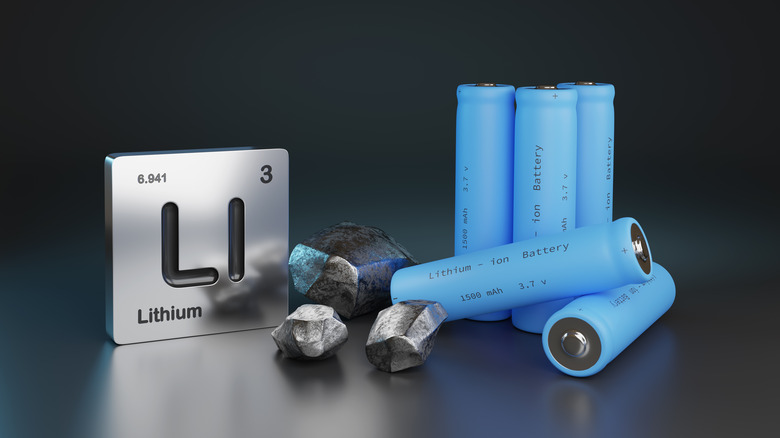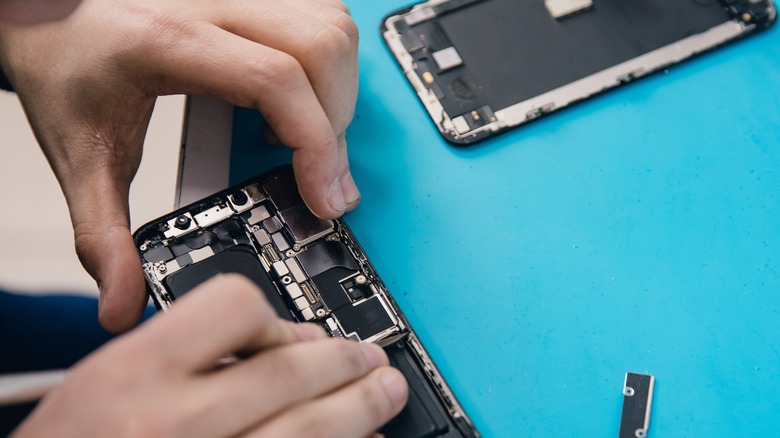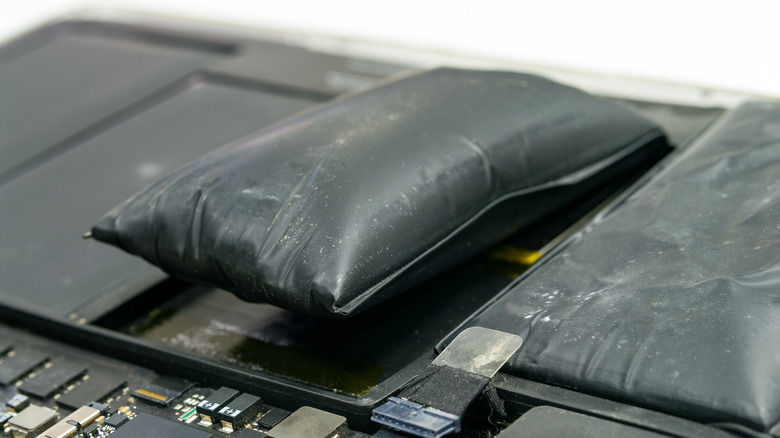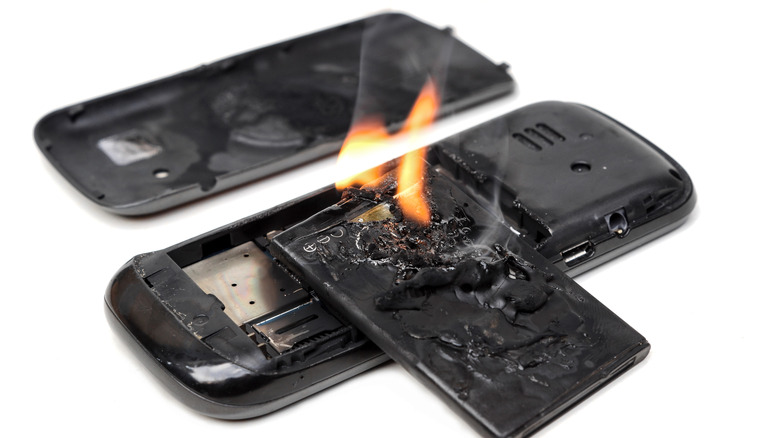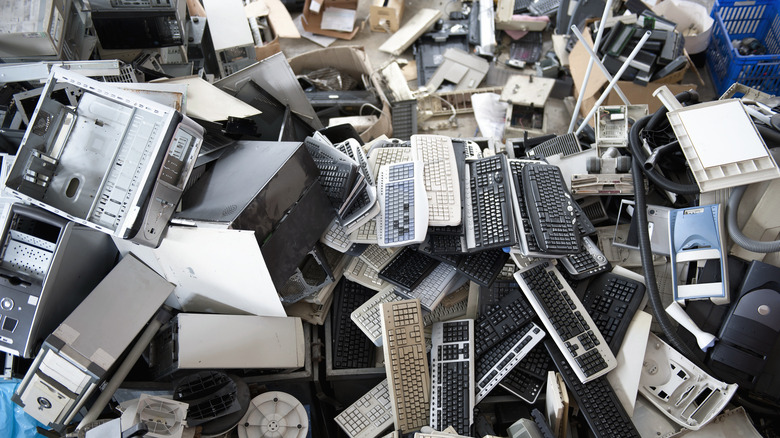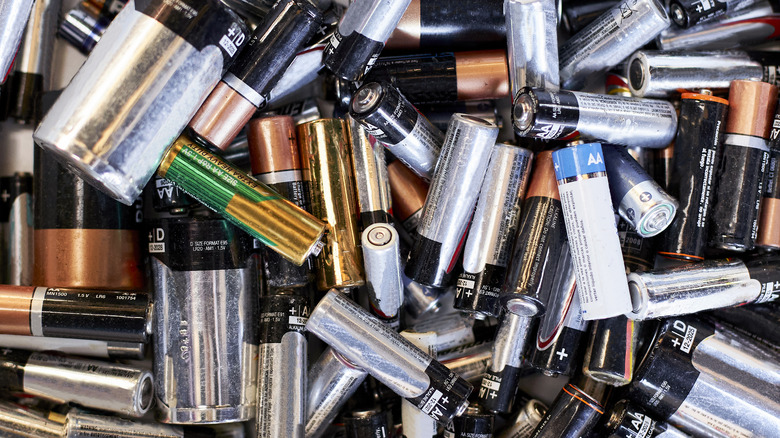The Biggest Problems And Disadvantages Of Lithium Batteries
When the battery was first invented in the 1800s, its energy storage capabilities unlocked innovation in unimaginable ways. From discs of copper and zinc held together by old-school electrolytes, the battery has evolved to the point wherein it's an essential part of everyday life. Since its inception, several types of batteries have been released into the market, such as alkaline, nickel metal hydride (NiMH), and lithium.
Among these, the most commonly used type of battery found in our homes, offices, schools, and everything in between is the lithium-ion battery. According to the Clean Energy Institute, lithium-ion batteries are the top choices for portable devices, due to their high energy density and relatively long lifespans. They are also believed to hold the highest potential for electric transportation methods, such as electric vehicles and electric airplanes. Apple, which uses lithium-ion batteries in most of its devices, notes that they tend to charge faster, last longer, and have higher power density than traditional batteries.
However, lithium-ion batteries are not without their fair share of problems and disadvantages. Here are some of them.
Degradation
In an Air Quality News article, Faraday Institution Ph.D. researcher Beatrice Browning shares that battery lifetime can be reduced when its electrode structure is damaged, which occurs when lithium-ion cycles in and out of the electrodes. In a study by the Royal Society of Chemistry, three main external stress factors influenced degradation: temperature, state of charge (SoC), and load profile. With a limited number of lifecycles, lithium-ion batteries naturally lose capacity with time. Although Battery University claims that counting cycles are inconclusive because a discharge may vary in depth, and there is no specific standard for what constitutes a cycle.
In addition, some uses for lithium-ion batteries, such as EVs, have external factors, such as charging rates, weather conditions, and charging practices, that affect their overall lifespan. Newark Electronics confirms that it's even possible for lithium-ion batteries to age, even without any use, due to continuous discharge. Lithium batteries can also degrade to issues beyond your control, such as due to manufacturing defects, which could lead to deadly consequences.
Battery swelling
Typically, battery swelling is a symptom of a variety of problems. For example, this could be due to something as simple as usage, such as overcharging or using the wrong voltage. Or, the bloating could be due to something beyond your control, such as manufacturing defects like damaged membranes. Aside from the obvious cosmetic issues this brings, such as bulging cases, it can also be potentially dangerous.
New Jersey residents filed a class-action suit against Apple in 2019 due to a battery swelling problem with the Apple Watch. Considered a safety hazard, the plaintiffs claimed that the battery swelling problem was said to physically pop off or break the Apple Watch screen.
In 2021, another class action lawsuit filed in California claimed every model produced lacked any "thermal or other solution to prevent and/or mitigate the danger of a detached, shattered, or cracked Watch screen resulting from the insufficient space allocated within the device for the rectangular shaped, electromagnetically charged lithium cobalt oxide battery."
Although Court House News shares that parts of this case were dismissed, it doesn't negate the risk of personal injury that was confirmed. Aside from Apple, many other electronics companies which use lithium-ion batteries suffer from the same issue.
Fire hazards
Because of their energy efficiency and lightweight nature, lithium-ion batteries are the top choice for many of today's electric vehicle manufacturers. Although they're relatively less prone to overheating, lithium-ion batteries can still catch fire, most commonly due to thermal runaway or uncontrollable heating. In fact, over 240 lithium-ion battery fires broke out across 64 municipal waste facilities from 2013 to 2020 in the United States (via the Environmental Protection Agency).
In 2016, Samsung permanently discontinued its Galaxy Note 7 line due to a design flaw that caused units to not just overheat but quite literally explode. This came after several users reported their Galaxy Note 7 devices exploding, including the replacement models. A few months after production was stopped, CNBC shared that Samsung pointed to issues with welding defects and short-circuiting lithium-ion batteries. Since then, the U.S. Consumer Product Safety Commission recall has covered 1.9 million Galaxy Note 7 phones in the United States.
Poor battery disposal practices
Although we've already established that all lithium-ion batteries will, at some point, be unusable, it's important to understand that there are still limited methods for disposing of them.
While some people get away with throwing AA batteries in the trash, the EPA recommends that lithium-ion batteries should never be included in household garbage or ordinary recycling bins. Because lithium-ion batteries are prone to fire, they can cause trouble from the transport process, such as in the trucks, to the actual landfill.
Therefore, it's vital to bring your unusable lithium-ion batteries to the appropriate waste collection and recycling facilities. In addition, the EPA also recommends taping terminals and keeping them in plastic bags. However, it cautions that it's best to check specific battery manufacturers for the appropriate disposal practices.
Although there has been a newly discovered method for recycling lithium, the reality is the proper disposal of household battery items takes a lot of effort. Not everyone has the time and energy to go to certified electronics recyclers.
Expensive to manufacture
According to EPEC, lithium batteries clock in as the most expensive out of all the types of battery chemistries, with prices for lithium batteries ranging around $132 per kWh in 2021. However, because they're more efficient, the cost is often justified by how long they are used.
While lithium-ion batteries are still the top choice for many types of electronics, our changing needs as a society require more efficient battery components in the future. Not to mention, there's hope that it becomes more affordable due to falling lithium prices.
In addition, we're developing new types of battery technology, like aluminum-ion batteries, that can charge significantly faster than lithium-based batteries. That said, they typically don't have the same density as lithium-ion batteries. With fast charging being a critical issue for electric vehicle owners, this could potentially lessen the barriers to EV transition, even if it means less range per charge.
